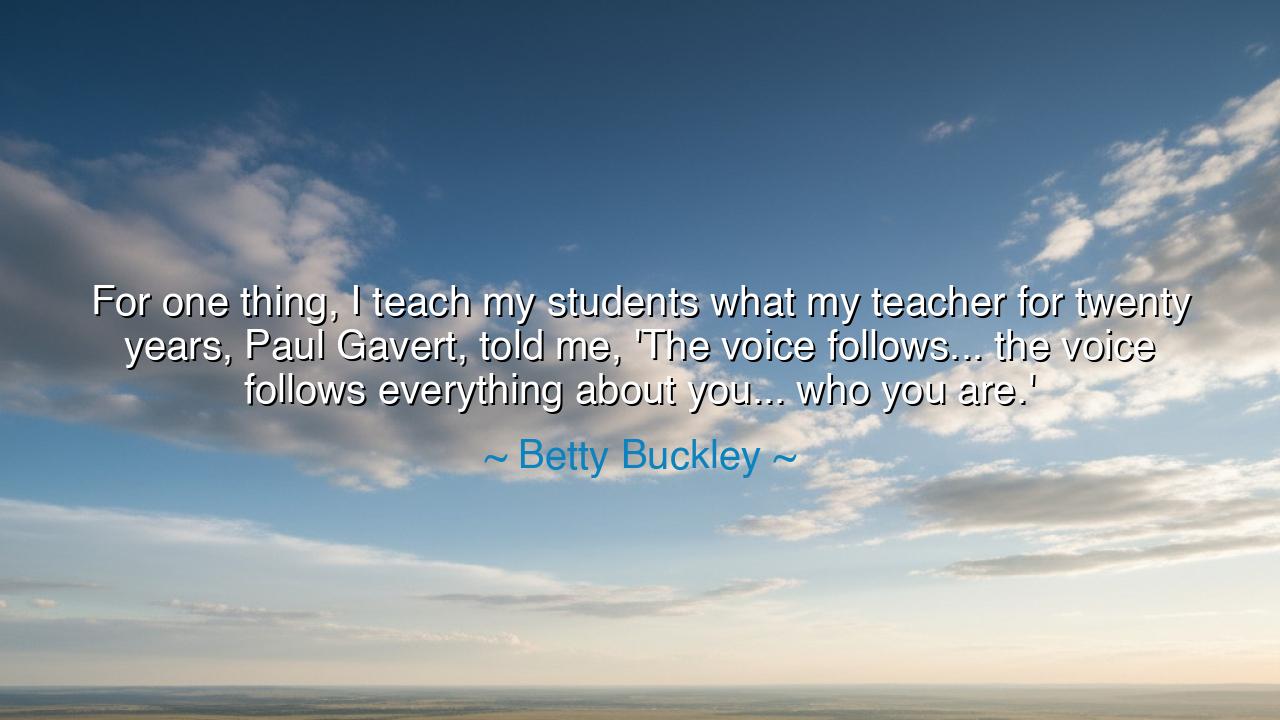
For one thing, I teach my students what my teacher for twenty
For one thing, I teach my students what my teacher for twenty years, Paul Gavert, told me, 'The voice follows... the voice follows everything about you... who you are.'






Hear the words of Betty Buckley, the great singer and teacher of the stage, who carried forward the wisdom of her master, Paul Gavert: “For one thing, I teach my students what my teacher for twenty years told me, ‘The voice follows… the voice follows everything about you… who you are.’” This saying is no idle remark, but a truth drawn from the depths of art and life itself. For the voice is not a mere sound—it is the echo of the soul, the outward breath of the inward being. To understand this is to see that every note we sing, every word we speak, carries the weight of our identity, our history, our very essence.
For Gavert knew, and Buckley after him, that the voice follows the heart, the mind, the spirit. If the singer is fearful, the voice trembles. If the spirit is proud, the voice grows harsh. If the heart is broken, the voice carries sorrow like a hidden undertone. No teacher can disguise this; no technique can wholly mask it. The voice follows who you are, because it is born from breath, and breath is the very rhythm of life itself. Thus, the student of song must first be a student of the self.
Consider the story of Billie Holiday, whose voice was unlike any other. She did not have the widest range nor the most polished technique, yet when she sang, the world listened in awe. Why? Because her voice followed her life—the hardship, the pain, the longing, the moments of fleeting joy. In every phrase, the listener could hear not just music, but a soul laid bare. She proved the truth of Gavert’s teaching: the voice cannot be separated from the person; it carries the weight of who you are.
This principle is not only for singers, but for all who live. For each of us has a voice, whether spoken or unspoken, whether sung in song or carried in action. And that voice will always follow our true nature. The dishonest man cannot forever hide the tremor of deceit in his words. The kind woman’s compassion rings in her tone even when she says little. The child who speaks with wonder reveals the purity of his heart. Thus, Buckley’s wisdom is universal: to strengthen your voice, you must first strengthen yourself.
And what does this demand of us? It demands that we cultivate truth within, that we live honestly, that we confront our own fears and desires. For if the voice follows, then your every action of discipline, your every practice of virtue, will shape it. Just as a river takes the color of the earth it runs through, so does your voice take the color of your character. Work, therefore, not only on sound, but on being—on patience, on courage, on love. Then your voice will be strong, not because it is trained alone, but because it flows from a soul rightly ordered.
This lesson is both humbling and liberating. Humbling, for it shows that you cannot hide behind technique alone; liberating, for it proves that your voice need not imitate another’s. You need only become fully yourself, and the voice will follow. This is why the great masters of every age sound different—Caruso, Callas, Holiday, Buckley herself—for their voices are not masks, but mirrors of the self. To sing truly, to speak truly, to live truly, one must embrace who one is, without fear.
Therefore, O seekers, take this wisdom into your lives: the voice follows everything about you. Do not ask only, “How can I sound better?” but, “How can I be truer, kinder, stronger, freer?” For as you shape yourself, so will your voice be shaped, and through it, the world will know you. Remember always the teaching passed from Gavert to Buckley, and now to us: the voice follows who you are. Live well, live fully, live honestly—and your voice, whether in song or in silence, will carry the eternal resonance of truth.






AAdministratorAdministrator
Welcome, honored guests. Please leave a comment, we will respond soon